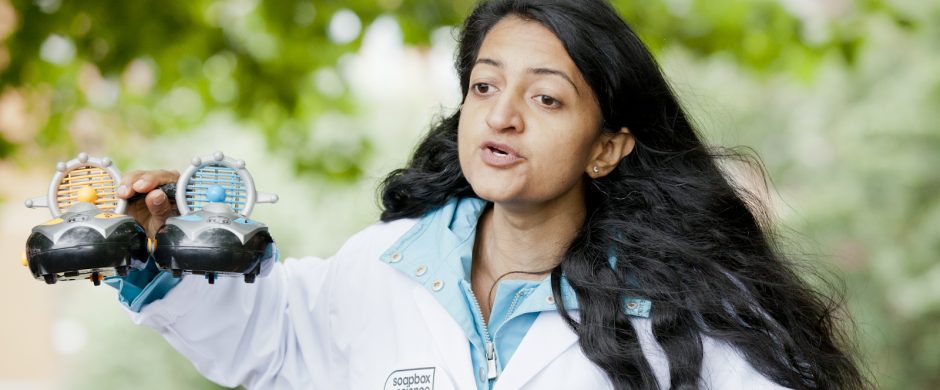 Soraya Meftah is a PhD Student based at the University of Exeter and Bristol, funded by the MRC GW4 Biomed DTP. Her current research focuses on early changes in connections between neurons in Alzheimer’s Disease. She does this using electrophysiology and multi-photon microscopy (measures electricity in the brain and looks at it using a really powerful laser beam!). Come and meet Soraya this Saturday at Exeter’s Soapbox Science event!
Soraya Meftah is a PhD Student based at the University of Exeter and Bristol, funded by the MRC GW4 Biomed DTP. Her current research focuses on early changes in connections between neurons in Alzheimer’s Disease. She does this using electrophysiology and multi-photon microscopy (measures electricity in the brain and looks at it using a really powerful laser beam!). Come and meet Soraya this Saturday at Exeter’s Soapbox Science event!
SS: How did you get to your current position?
SM: By many applications and a little luck! I was working at a pharmaceutical company in research and development and decided that I enjoyed and wanted to do research as a career. So I made the decision to apply for a PhD. I’d heard of the research happening here and at Bristol and decided that it would be a good fit for me and match up with the research I was doing at the time. So here I am! But it didn’t come easily, it took a lot of searching, a number of applications (and rejections) before I ended up with a few offers of where to go and decided that here would be the best fit.
SS: What, or who, inspired you to get a career in science?
SM: Well I’ve always enjoyed science. The fact that you can constantly be working at new and challenging things was always a draw. When I was younger, I was intrigued with the world around me and science always gave me new challenges and kept me interested. So I think that gave me the idea that I would like science. However, I think there have also been people in my life that have helped me along the way including a number of very encouraging supervisors that have supported and kept me going in science.

A neuron filled with a dye after recording
SS: What is the most fascinating aspect of your research/work?
SM: So my current and previous research has been on Alzheimer’s Disease. It’s a terrible disease that affects 850,000 people in the UK alone, and to be able to work at helping to understand and combat a disease like this is really rewarding. I guess the most fascinating part of my research is that I am helping to shape my area of research that will help the larger field of research and find out novel things that no one else has seen. Currently, I’m focussing on the way the connections in the brain in a model of Alzheimer’s Disease change and how they change prior to seeing any symptoms. I’ve seen some subtle changes that may hint at early alterations in these connections in Alzheimer’s Disease.
SS: What attracted you to Soapbox Science in the first place?

Giving a talk about some of my data
SM: Soapbox Science is something that encompasses a lot of aspects that I feel are important in science. Engagement with the public about science is important as we are at the end of the day serving the public. Scientific research would not be happening without the support of the public and we owe it to them to share what we know with them. Also, it’s fun to share what you have learnt about the world and people are interested in learning about what we do.
In addition, increasing the visibility of women in science and the struggles we face having a career in science is the only way we will change how things work. I couldn’t imagine having a career in anything else and so making it easier for women who want to stay in science without extra barriers being in the way is really important to me and for the future of science. Our thoughts and research are just as valuable and yet we are overlooked in multiple ways.
SS: Sum up in one word your expectations for the day
SM: Sciencitement!

Me with my electrophysiology rig in Exeter (ready to record some cells!)
SS: If you could change one thing about the scientific culture right now, what would it be?
SM: Job stability vs pressure to move. In science, or at least in my field, there isn’t always job availability at the end of your contract (usually short and fixed term of 2-3 years) and when that’s done if you haven’t managed to secure money then you’re looking at moving somewhere far away typically to get another job doing similar work.
SS: What would be your top recommendation to a woman studying for a PhD and considering pursuing a career in academia?
SM: Perseverance! It took me a while to get where I am currently, and I had to work hard but I think if you aim and be realistic with those aims you will get there.
